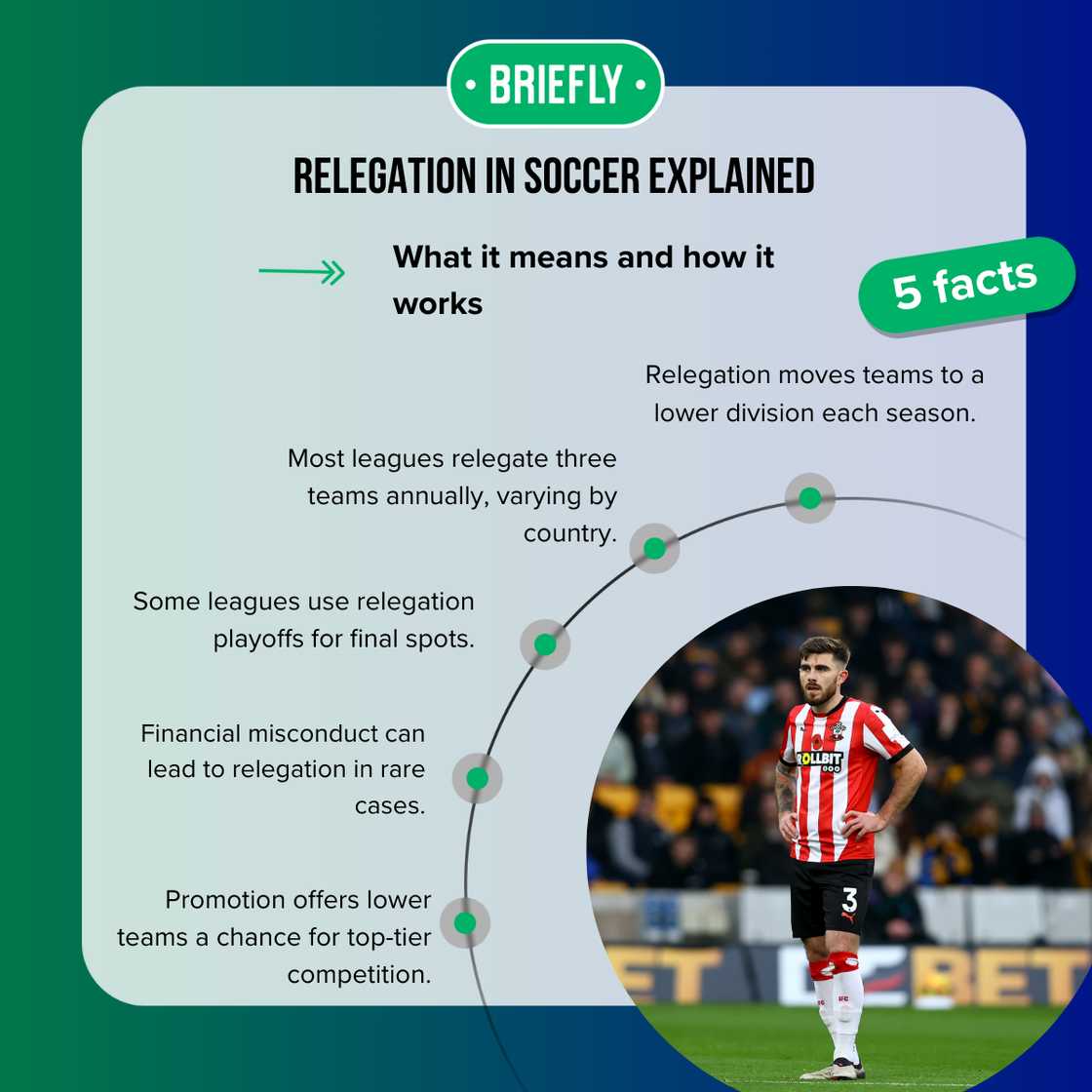Relegation in soccer explained: What it means and how it works
Relegation in soccer is an important aspect in many nations, with clubs' fates determined by their performance over a season. It is strongly ingrained in the promotion and relegation system, a notion common to all leagues worldwide.

Source: Getty Images
TABLE OF CONTENTS
Soccer is one of the world's most popular and highest-paid sports, characterised by a distinct and dynamic system. Here, we explain relegation in soccer, how it works, and what it means for squads and supporters alike.
What is relegation in soccer?
Relegation in soccer refers to the process where teams finishing at the bottom of a league's standings are demoted to a lower division for the next season. This is in contrast to promotion, in which the best-performing from a lower division advance to a higher league.
Together, these elements form an integral part of the soccer pyramid. They ensure that teams move fluidly across divisions based on merit.
The goal is to preserve competitiveness and motivate teams to continually perform at their peak. As reported by Top Soccer Coach, the relegation system originated in England in the 19th century and has since been a defining feature of European football leagues and other competitions worldwide.
How does relegation work in soccer?
In most leagues with a relegation system, the number of clubs demoted varies between two and three. For example, in the English Premier League (EPL), the bottom three clubs at the end of the season are demoted to the Championship, English football's second division.
Similarly, lower-division clubs compete for promotion to the upper league. This system is cyclical, guaranteeing that each team's participation in a league is earned rather than guaranteed.

Source: Original
Relegation playoffs
In certain leagues, relegation is determined by more than just league standings. Instead, playoffs are conducted. These games usually feature teams just above the automatic relegation slots competing against high-performing clubs from the lower level.
For example, the Bundesliga in Germany has a relegation playoff in which the third-last team in the top level competes against the third-place team from the second division. The champion earns a position in the top-tier league for the next season.
Relegation due to fair play rules
Although rare, clubs can also face relegation due to breaches of fair play rules, including financial misconduct or regulatory violations. For example, if a club fails to follow wage limitations, tax regulations, or league-imposed financial standards, it may be relegated as a punishment.

Source: Getty Images
According to The Mirror, around eight teams have been demoted owing to such difficulties throughout soccer history. ESPN reveals that Lyon is currently dealing with a similar situation. The club has been provisionally relegated from Ligue 1 at the end of the season following allegations of financial mismanagement.
How many teams get promoted and relegated?
In most leagues, three teams are promoted and relegated each season, though the number varies. Here is how it works in some other world top leagues:
- Premier League (England): Three clubs are relegated to the Championship, while three are promoted—two automatically and one through playoffs involving the teams finishing 3rd, 4th, 5th, and 6th in the Championship.
- Serie A (Italy) and La Liga (Spain): Follows the three-up, three-down rule.
- Bundesliga (Germany): The bottom two teams are demoted automatically, while the third-bottom team competes in a relegation playoff against the third-placed team from the 2. Bundesliga.
- Ligue 1 (France): As of the 2023-24 season, Sky Sports reports that two teams are automatically relegated to Ligue 2, while two are promoted. Additionally, a playoff takes place between the third-to-last team in Ligue 1 and the third-placed team in Ligue 2.
- MLS (USA): Does not use relegation. It has a fixed membership and operates as a closed league system.

Source: Getty Images
Why is relegation bad?
While the relegation system keeps leagues competitive, it has its drawbacks. Here are the main reasons why teams put the best possible effort on the field.
- Financial instability: Relegated teams often lose a significant portion of their revenue, leading to budget cuts, player sales, and even bankruptcy.
- Loss of talent: Players frequently leave relegated teams to join top-tier clubs, weakening the squad.
- Fan disappointment: Relegation can be disheartening for fans, especially those of clubs with rich histories.
- Unpredictability: A single bad season due to injuries or managerial issues can doom a team, even if it has traditionally performed well.
Advantages of the relegation system
While relegation can be harsh, it brings several positive aspects in soccer. These benefits help maintain the excitement and fairness of the competition, ensuring that teams are always striving to improve.
- Keeps competitions exciting: Teams at the bottom fight hard to avoid relegation, ensuring action-packed matches until the final game.
- Merit-based movement: Only deserving teams stay in top-tier leagues, maintaining high competition.
- Opportunities for new teams: Promotion allows lower-division teams to rise and prove their capabilities.
Frequently asked questions

Source: Getty Images
Relegation sparks heated debates among fans and pundits alike. To shed more light on this crucial aspect of soccer, here are answers to some of the most frequently asked questions.
- What does it mean to be relegated in the Premier League? It means a team finishes in the bottom three positions of the Premier League and is demoted to the Championship for the next season.
- How many wins do you need to avoid relegation? There is no set number, but 11 wins and some draws are usually enough to avoid relegation. According to All Football, no club has gone down with 11 wins in a 38-game Premier League season, while nine have been relegated with 10.
- Who was relegated from the Premier League? In the 2023-24 season, Luton Town, Burnley, and Sheffield United were demoted to the Championship.
The relegation system is integral to soccer's character, encouraging competition and rewarding excellence. While demotion may appear punitive, it ensures that every match is important, from the season opener to the last whistle.
READ ALSO: How wide is a soccer field? Dimensions and layout explained
Briefly published an article about soccer field dimensions and explained the layout. Understanding how large a soccer field is can provide vital insights into games and strategy, whether you are a spectator, a coach, or just interested in the sport.
The width of a pitch varies with the level of play. This article reviews the intricacies of field measurements, restrictions at different levels, and comparisons.
Source: Briefly News






